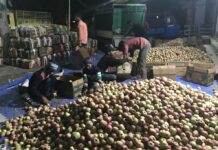Some enthusiast growers may be preserving the fabled Ambri, the king of Kashmiri apples, in an odd orchard in Shopian. But others are upbeat about growing a hybrid Lal-Ambri that may revive the glory of Ambri partially. Javaid Naikoo reports.
Cultivating Ambri, the king of Kashmiri apple, is now just a hobby. Shopian, once considered the heart of Ambri production in Kashmir, because of its moderate temperature, is still ranked at the top when it comes to the quality of apple production. But the Ambri is almost missing from the orchards.
Historically, Kashmir in general and Shopian in particular has had a distinctive position in the world for producing a particular variety of apple called “Ambri”.
Researches say that Ambri is an indigenous Kashmiri variety and was most widely cultivated apple till about 1960s when some imported and highly commercialized advanced substitute varieties of apple trees were introduced.
According to Adnan Ahmad, a well-known fruit grower of Pinjoora Shopian, Ambri was pulled back from the orchards, because of diverse drawbacks that include late fruit yield, alternate bearing and highly disease prone nature of the Ambri. At the same time because of the coming of some consumer attractive and market oriented apple tree varieties in Kashmir like Delicious, it was considered capital and labour intensive variety.
Adnan is a staunch believer of preserving the exceptional varieties in his orchards. Even today, in spite of drawbacks and heavy fixed costs, he has still preserved 40 Ambri apple trees in his orchards.Despite receding demand for Ambri in the market, Adnan never gave up his enthusiasm for the fabled apple variety. He thought of niche marketing for his Ambri produce and last year sold his special produce to Nova Bazar Shopping mall in Srinagar. However, Adnan complains that government took no initiative to preserve the traditional legacy of Ambri in Kashmir.
 Experts believe that Ambri has a much longer shelf life than any other variety of the apple. They argue that because of tall and broad structure of Ambri tree, the yield capacity was about 40-50 boxes of apples per tree and such a production ratio is rare among other apple varieties available in Kashmir today. Fruit growers in the area say that in addition to its commercial potential, Muraba Ambri, the B-grade of the variety, has medicinal properties as well.
Experts believe that Ambri has a much longer shelf life than any other variety of the apple. They argue that because of tall and broad structure of Ambri tree, the yield capacity was about 40-50 boxes of apples per tree and such a production ratio is rare among other apple varieties available in Kashmir today. Fruit growers in the area say that in addition to its commercial potential, Muraba Ambri, the B-grade of the variety, has medicinal properties as well.
“Muraba Ambri was considered a homemade medicine,” says Intikhab Alam, a local fruit grower and seller. “New generation of buyers and sellers in our local fruit market hardly know about Ambri, which is astonishing.”
Economists believe that historically the secret behind the healthy per capita income in District Shopian could be attributed to the Ambri orchards people here owned. They say quick success rate in cultivation diverse other varieties of apple in Kashmir motivated growers to move away from a longer gestation period of making new Ambri orchards. It is much easier to buy quick yielding saplings compared to a long wait for the Ambri to start yielding fruit.
Till a few decades back, the map of Shopian was drawn in the imagination of its residents by Ambri orchards situated all across the area. Many main localities in the area used to marked by particular Ambri orchards like ‘Kuli Baag in Gagren, Kak Singh’s Ambri Baag in Saidpora, Dewaan Ambri Baag in Chowgam and Khan Ambri Baag in Pinjoora are still remembered for their fame.
Keeping in view the short-term commercial disadvantages of Ambri, researchers claim to have now introduced a new variety of Ambri which they affirm can compete with the already available more than three hundred varieties of apples in Kashmir.
“The cross breed of traditional Ambri versus Red Delicious and traditional Ambri versus Maharaji has given us an advanced variety of Ambri called Lal-Ambri,”says Kamal Farooqi, an Emeritus professor.
But, some cultivators are again inspiring others to revive the glory of Ambri. Khawja Abdul Aziz Bazaz of Nowshehra Srinagar has his all Ambri orchard spread over an area of 75 kanals in Budgam. That has encouraged some people now to cultivate the newly introduced Ambri varieties in their orchards many places across Kashmir.
Experts believe that newly prepared Lal-Ambri is suitable to the moderate climate of the valley. The Lal-Ambri tree starts yielding the fruit in just five years after plantation compared to 12 years the traditional Ambri takes to start bearing fruit. This variety is believed to be less prone to disease compared to the traditional Ambri.
Moreover, growers in the area say that no doubt over the years central and state governments initiated various schemes for the upliftment of the horticultural sector, however there is not a single scheme with the government, which could have come to the rescue of fruit growers to save the traditional variety of Ambri in Kashmir.















